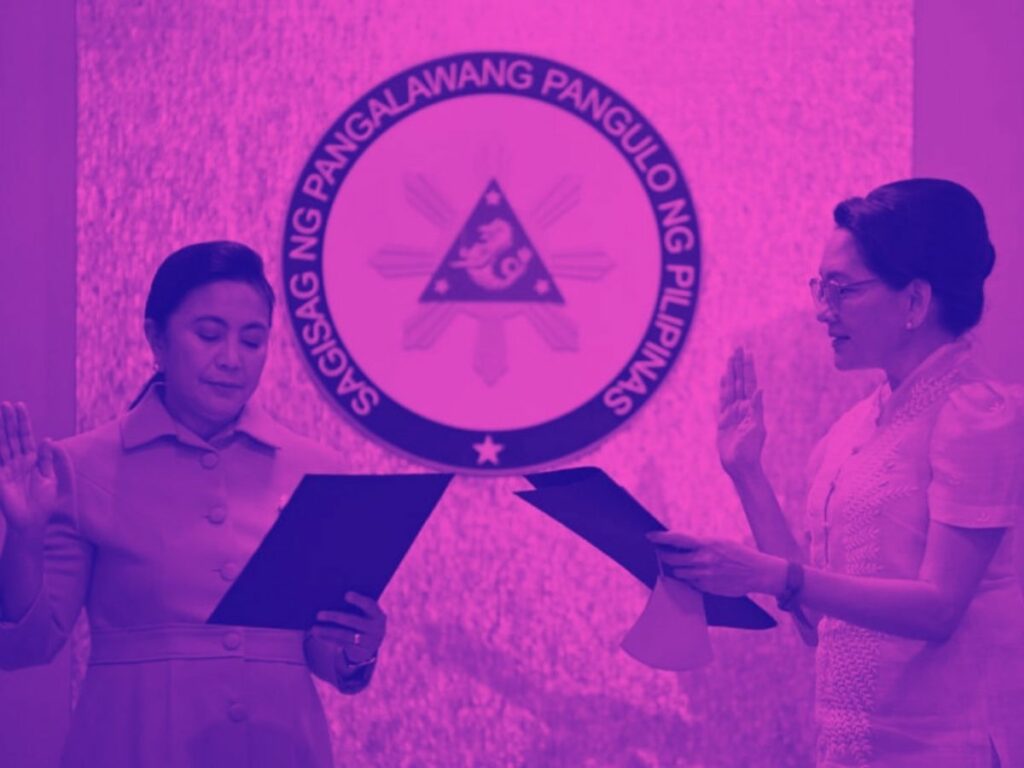Philippines Vice President Leni Robredo’s last-minute presidential campaign raised a stunning political storm all over the archipelago. Hundreds of thousands of volunteers and supporters (popularly described as the “pink tide”) self-mobilized and used their own resources in the hope of installing, at last, a leadership that would be intolerant of corruption, respectful of the rule of law, and responsive to the needs of a neglected citizenry.
Although Robredo lost the May 2022 election to the son of the late dictator Ferdinand Marcos, with 15 million votes to his 31 million, her campaign offers a strategic guide for the Philippine Left in its long-game contestation for political power. It shows that the mass movement for popular-democratic reforms must be the leading edge of democratic socialists’ struggle for electoral victory.
Dream candidate
Robredo was a dream reform candidate. She has no taint of corruption. A lawyer who comes from the ranks of non-governmental social reformers and advocates for the poor, she effectively used her limited vice-presidential budget for grassroots livelihood programs and timely pandemic and disaster relief in the natural calamity-prone country. As a symbol of “good governance” she inspired enthusiastic mass rallies unprecedented in Philippine elections. With their size and infectious spirit, they dwarfed the bused-in and paid-for crowds around her main opponent, Ferdinand Marcos Jr. The mobilizations gave her supporters the hope, even the illusion, that they could finally defeat the rule of traditional politician-rent seekers who have long used the state as a milk cow and a personal political weapon.
Post-mortems of Robredo’s campaign show a number of weaknesses. It took her a while to decide to run, thus her late rollout. She had no machinery, her Liberal Party having all but collapsed from defections to the Duterte administration. And she had no war chest, being a person of modest means; her mass supporters had to self-finance their mobilizations on her behalf.
Marcos, meanwhile, had many advantages. His family had been plotting its political comeback since 1992. Large numbers of current voters (52 percent of registered voters were age 18 to 41) did not experience the abuses of the dictatorship. Much of the population, disillusioned by the checkered performance records of most post-dictatorship administrations, have become receptive to the Marcoses’ false narratives. Indeed, with their ill-gotten wealth, the family bankrolled troll disinformation and the rebranding of the dictatorship as a “golden age” (a Facebook analyst called the Philippines “patient zero” in the worldwide digital disinformation epidemic).
Patron-client politics
A more basic obstacle, however, blocked the people’s movement that surged behind Robredo: the strong and historically rooted tradition of patron-client relationship that has been the bedrock of the oligarchy’s political hegemony. People rely on the beneficence of wealthy and powerful clans because they cannot count on the state to look after their welfare. Thus, choices among competing political dynasties/personalities, not parties and programs, have determined how people vote within the country’s formal democratic system.
In 2016, only 250 families, representing political dynasties in the Philippines, controlled all of the political levers of the country. About 80 percent of provincial governors belong to so-called “fat dynasties,” or clans with two or more members in power at the same time. Political families also held 67 percent of seats in the House of Representatives, and 53 percent of mayoral posts, according to the Ateneo School of Government. Switching political parties is endemic, making them parties of convenience, not political visions. Of the 192 members of the lower house of Congress, 77 switched to the political party of Rodrigo Duterte when he won the presidency, 47 of whom were from the opposition Liberal Party. This routinely happens when a new president is installed.
Elite political hegemony and the prevailing electoral culture are legacies from both Spanish and American colonialism. The Spanish privileged landed native clans as tax collectors and colonial overseers. The Americans also made wealth and educational attainment the requirement for tutelage of native subalterns in a semi-feudal society. Thus, the fundamentally undemocratic patron-client relationship has prevailed from the very birth of the modern republic. It is the only electoral culture Filipinos have ever known.
Its most dramatic disruption occurred during the 1986 snap presidential election preceding the People Power uprising that toppled the dictatorship, but that transpired during a combined economic and political crisis. Marcos’ debt-driven export-oriented, economic policy had been driven to failure by his and his cronies’ plunder, while the brutal assassination of his political rival Benigno Aquino triggered widespread political unrest. Marcos’ naked attempt to cheat Corazon Aquino of her victory in the snap election became the combustible prelude to the People Power uprising that ousted him.
By comparison, the recent election occurred when the economy was relatively stable, despite the pandemic, and President Rodrigo Duterte was popular. The enduring grip of the backward electoral culture was still too formidable for Robredo’s pink tide to loosen in one surge.
Whether it would have required an existential crisis of the status quo for Robredo to win is an implication progressives must mull regarding their electoral future. What is certain is that it will take protracted struggle to erode and eventually overcome the disempowering electoral culture of the Philippines. In this light, the Philippine Left can derive a strategic lesson from Robredo’s campaign by recognizing its aspirational content.
Democratic and Reformist Content
The diffuse popular aspiration for a modern democratic government found unprecedented voice in the pink tide. It was especially strong among the middle classes, much of whose expansion is fed by remittances from millions of Filipinos working overseas. The campaign stirred a movement against corruption, the naked pursuit of self-interest in government, official impunity, and rising authoritarianism.
It was not anti-imperialist or anti-capitalist. Nor was it socialist; Robredo’s plan to use the authority and resources of the state for poverty alleviation was the extent of her tilt to the left. She had no proposal for fundamental changes in the economic system, the regulation of the capitalist market, or the acquisition of a social dividend for an extensive social safety net. Yet, it was an inspired effort to block the continuation of Duterte’s autocratic legacy and the return of the corrupt Marcoses to the helm of the state.
In short, this new ferment has a popular-democratic content, which has attracted a broad spectrum of adherents, from Left activists to liberal celebrities, business owners, former public functionaries as well as retired military officials respectful of the democratic Constitution. Although it still must gain more resonance and take root among the poor, the source of 78 percent of the votes in the last election, Filipino democratic socialists must view its emergence as a positive development and not succumb to ultra-left radicalism that would dismiss it as a “middle class” phenomenon or the creature of “elite liberalism.” Neither must they abandon the independent mass work of popularizing their socialist vision among the basic sectors of society, while being a central mover in forging this popular democratic united front. It will serve as the battering ram against traditional elite politics and hegemony, whose every loosening improves the chances of democratic socialists’ own electoral efforts.
Vice President Robredo’s term has ended, but her symbol as a democratic antithesis to traditional elite politics and authoritarianism retains its mobilizing power. Meanwhile, Democratic socialist Senator Risa Hontiveros of Akbayan Party has retained her seat and is now the lone opposition leader in government. Robredo and Hontiveros must seriously consider the growing call for a “new political party” coming from the pink campaign’s enthusiastic new activist ranks and adherents. The time is ripe for a popular democratic united front.
Featured image: Outgoing Vice President Robredo swearing in democratic socialist Sen. Risa Hontiveros of Akbayan Party, a Robredo ally who retained her Senate seat and is now the only opposition leader in government.
Did you enjoy this article?
We're in the middle of our annual fund drive, and this year we're building our own internal infrastructure for subscriptions, meaning more of every dollar pledged goes to fulfilling our mission. Subscribe today to support our work and be a part of Convergence's next evolution.

